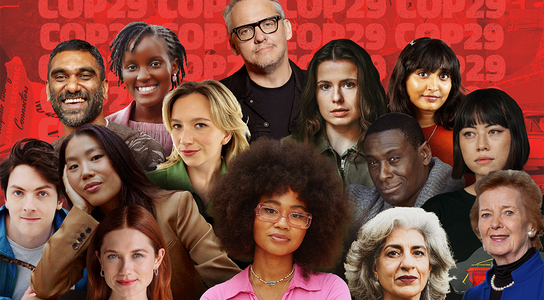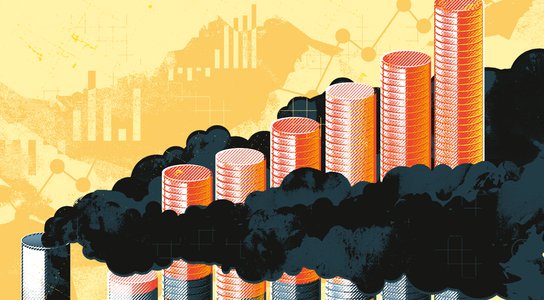Ahead of the Oscars and BAFTAs, we asked Global Witness staff to choose their favourite films related to the climate crisis.
Mossville: When Great Trees Fall
Words really fall short in describing how powerful the story of Mossville is. It's one you have to see for yourself.
Described as "the material toxicity of racism" by the New York Times and how "the story of Mossville is the story of America," by William J. Barber III, the film tells the story of Mossville, Louisiana: a once-thriving community founded by formerly enslaved and free people of colour, and an economically flourishing safe haven for generations of African-American families. Today it's a breeding ground for petrochemical plants and their toxic black clouds.
The film follows one man who refuses to abandon his family's land, despite prolonged exposure to contamination, pollution and destruction that forced the rest of the community out. Yet it's also a story that connects the struggle for environmental justice from Louisiana to South Africa and beyond, where communities time and again face the toxic fallout from the massive corporate power of polluting industries.
Just this month, the UN Human Rights Office hosted a virtual screening of the film to kick off the 28th Session on Environmental Justice, the Climate Crisis, and People of African Descent. Check out how you can see the film and support the project here: http://www.mossvilleproject.com/
Julieta Biegner, US Communications and Campaigns Officer
Seaspiracy
Seaspiracy is the latest viral documentary to hit Netflix. With its courageous investigative journalism, coupled with clear and captivating story-telling, it’s easy to see why it’s proven so popular and is topping the most viewed charts all over the world. Filmmakers Ali and Lucy Tabrizi aim to shock audiences into caring – and ultimately doing something – about an issue they view as the most critical to the sustainability of our planet, namely what is happening in our oceans.
The story begins with a focus on plastic in the ocean but very quickly expands out to hone in on global fishing practices, carried out by big business. It’s a regular theme throughout the film of challenging conventional and mainstream understanding of the problems in our seas. This is particularly welcome and resonates with Global Witness’ own campaigning efforts, to move away from the idea that individual acts of consumers are most responsible for environmental destruction, when in truth it is huge multinationals disproportionately to blame. One of the many striking facts – this is a film that uses facts extremely effectively – reveals that almost half of all plastics in the Great Pacific Garbage Patch are discarded fishing nets, rather than straws and cotton buds.
One particular scene that illuminates this point shows a small group of fishermen from a Liberian coastal community risking their lives in a makeshift boat to ask bigger ships to
throw down food. Tabrizi then explains that overfishing in Liberian waters, by big business, has depleted an important food source for the local community. It is the “industrialisation” of fishing that is highlighted as the problem. Whilst the land impact is well noted here, there are moments where other environmental damages are downplayed. At times the film tries to counterpose the global focus on deforestation and fossil fuels against the lack of attention on the oceans. Of course this is more a tactic to win attention, rather than dismiss the work organisations like Global Witness do but the film could have given more care to this argument.
There does also seem to be some disconnect with the final conclusion and the great work done earlier in the film to position the problem away from individual acts. “Don’t eat seafood” is the top message, as a consumer choice, as opposed to empowering viewers to campaign in more active ways. That being said there is no doubt this is a high-impact, well-made, campaigning film that should be both applauded and learned from. As a featured voice throughout, George Monbiot and others are in fine form, amidst a narrative that brings a much needed focus and emotion to what is happening in the world’s oceans.
Dominic Kavakeb, Senior Communications Adviser
I am Greta
Greta Thunberg is arguably one of the most influential climate crisis activists of our time - helping to inspire the global Fridays for Future movement and hundreds of thousands of young people in at least 60 countries to take action for the climate.
This documentary offers an insight into Greta’s life and charts her journey from a lone figure and outsider at school, standing outside the Swedish Parliament on her first school strike, to speaking at international conferences such as COP. We see her heartwarming relationship with her father, who accompanies her everywhere, even on a challenging journey at sea, we see her giggling at right-wing politicians and press who mock her, we witness her laser-like focus on climate science, and watch her craft speeches on her laptop before high-level meetings, obsessing over how to get leaders to listen.
Greta is clearly an intelligent and influential activist, who is determined for the world to avoid a climate disaster. Yet, what makes for uncomfortable viewing is how politicians and experts patronise her and treat her like a schoolchild. Adults ask her for selfies, but barely listen to her. The French Emmanuel President Macron appears to smirk at her as he says, ‘so you take the train everywhere?’ British politician Jeremy Bercow simply says to her, ‘Just do what you believe is right’, without sharing what the British government could do. Greta herself becomes increasingly aware that she is being used at public events as a token gesture to the climate movement.
‘Did you hear what I just said? Is my English OK? Is the microphone on? Because I’m beginning to wonder,’ she says in a speech at the UK’s Houses of Parliament. The ministers laugh - but she means business, she wants to be heard, she wants youth voices to be heard.
Jasmin Qureshi, Multimedia Manager
This Changes Everything
This Changes Everything, the feature documentary of Naomi Klein’s critically acclaimed book of the same name, turns the way we think about climate change on its head. What if climate change isn’t just the story of doom, despair and destruction, what if it’s the best reason the world has ever had to build a better world – to change everything? In the face of the climate crisis, there can be no status quo, the world as we know it is being transformed by the changing climate – but instead of facing down an ever more hostile environment, people around the world are instead creating a more just, healthier, cleaner, fairer world.
The film takes a tour through the frontlines of the fight against climate change, and against the pursuit for economic growth at all costs that is driving the crisis. From the tribes fighting tar sands extraction in Canada, through opposition to mining companies in Greece and to power companies in India – this presents the huge, varied and interconnected movement pushing back against the climate crisis and for a better world.
Murray Worthy, Campaign Leader, Gas team
Virunga
Virunga is a beautiful and powerful documentary which brings together several compelling narratives: the terrible violence that has ravaged eastern Democratic Republic of Congo (DRC); the British oil company seeking to drill in the midst of the beauty of Africa’s oldest national park; the incredible young journalist on the case; and the tear-jerking relationship between a handler and his gorilla "family".
After the documentary was shot, non-governmental organisations including Global Witness, which had been following the case previously, were able to put intense pressure on the oil company, Soco International, to stop its activities inside the park. Our investigators uncovered further signs of corruption and human rights abuses and eventually the company left the DRC, leaving the park in peace.
Shortly after we discovered that the Ugandan government was about to issue an oil licence in the same area, putting the park at risk once again. We rallied our allies and fought a successful public campaign to stop oil companies bidding for the block. This wouldn't have been possible without the publicity the film achieved. The park is safe for now but oil companies are still opening up new oil reserves all along the Uganda/DRC border, putting many protected areas at risk.
George Boden, former Campaign Leader, Industries Team, Land and Environmental Defenders
Giant
Come for the bevy of cinema legends (Dean, Hudson, Taylor, Hopper), stay for the fact it’s James Dean’s last big screen appearance, leave with the clear message that all the oil in the word will not bring you happiness. I could have taken this epic tale of a simple farm hand striking black gold at face value but instead I feel we must marry the current climate crisis with the possible subliminal messaging throughout the movie on the dangers of America’s reliance on oil: Bick Benedict: Just remember, one of these days, that bourbon's [oil’s] gonna kill you. Uncle Bawley: Okay, it'll be me or it. One of us has gotta go.
So who’ll be the first to go – us or oil?
Richard Gardiner, Senior Campaigner – Corporate Accountability
The New Corporation
The New Corporation sounds the alarm about the role of big business in the biggest challenges we are currently facing - the climate crisis and related human rights abuses. This film is a grand and devastating overview of everything wrong with today’s world: forest destruction, ruthless extraction of fossil fuels, erosion of democracy and murders of land and environmental activists - all linked back to the enormous power and influence of corporations who value profit above people. One of the most striking sequences pits the devastation caused by energy companies against their greenwashing activities and corporate social responsibility PR campaigns.
The New Corporation also shows us a glimpse of a better future - and outlines the changes that are already happening. The film shows us politicians who DO represent people, rather than business, who have come to power through grassroots movements. It gives a platform to land and environmental defenders who HAVE managed to stop destructive companies. It points to the racial justice movements as reasons to look forward to positive change. Despite the apocalyptic nature of the film, I left it with a feeling of hope.
Jasmin Qureshi, Multimedia Manager
Author
-
Jasmin Qureshi
Multi-Media Editor


